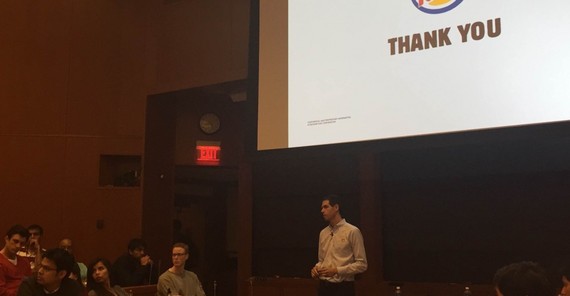"If you behave like an owner, we'll make you one." Daniel Schwartz
After Daniel Schwartz was appointed CEO of Burger King last year, Bloomberg Businessweek provokingly ran a cover story this year that bore the title "Burger King Is Run by Children." The illustration showed an angry customer and a CEO dressed in children's clothing. At the time of Schwartz's appointment, he was only 32 years old. The average age of a CEO in corporate America is well above 50. Naturally that made him an outlier in the corporate world.
Schwartz was mocked for looking as young as he did during his student days at Cornell. He was not taken seriously as he had no experience in the fast food business. Instead his Wall Street career after college suggested CFO, not CEO.
When Schwartz visited Harvard Business School last week, however, he demonstrated that he has proven his critics wrong. He has turned Burger King into the fastest growing quick service restaurant after Domino's. Stores have been refurbished. The brand rejuvenated. In short, the culture of Burger King has become more youthful and dynamic.
Today, the company feels more like a startup than a corporation. And he instilled his philosophy of ownership into the culture. "If you act like an owner, we make you one," he revealed, encouraging students that this was just the beginning of a decade long strategy of making Burger King more visible in the world.
Prior to Burger King, Schwartz was working for 3G Capital, a global investment firm. When 3G bought the chain in 2010, he became its CFO first. Then last year he became the company's 21st CEO. When I asked him about how he became CEO, he modestly attributed this to hard work and right timing. "I am not smarter than anyone else," he said. It is usually the smartest people though that say that.
After the talk, I asked myself what did he do differently. I remembered Peter Thiel's talk from two weeks ago. Thiel confided in students that he did not ask himself enough why he was studying at Stanford. He was too competitive at the time. I believe that you have to prove something to the world, or do certain things before you could actually do what you wanted to do in the first place resonated with me.
Schwartz's ascent to CEO of Burger King inspired me. Certainly there were many factors at play, but the more I thought about it, the more I thought that one of the key ingredients was what Shane Snow, author of Smartcuts, calls "hacking the ladder."
Hacking the ladder means not playing the game that everyone else plays. Making your own ladder means not competing for competition's sake. It means forging your own path. Snow discovered that over the past 300 years our presidents are younger than our senators. Intuitively that does not make sense since a president is higher in the ladder than a senator. The short answer, however, is that the presidents acquire leadership and credibility in different fields and then switch to politics. As Snow writes if we want to be more successful, we have to think more like hackers and act more like entrepreneurs.
It is easy to follow someone elses's path, as Ralph Waldo Emerson understood so many years ago here at Harvard. Instead of going where the path may lead, Emerson urged students to go where there is no path and leave a trail.
This was originally published at The Harbus, the student newspaper of the Harvard Business School.

